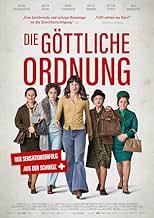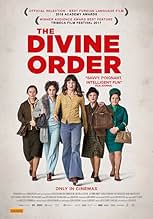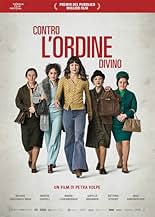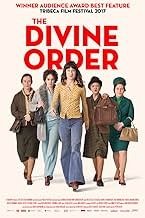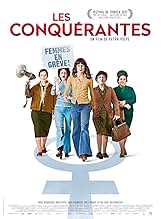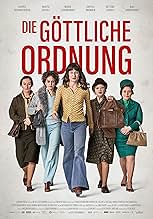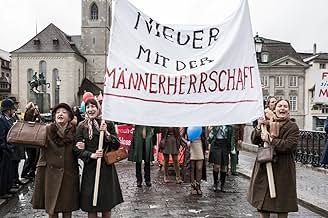IMDb RATING
7.1/10
3.3K
YOUR RATING
In 1971, a young housewife organizes the women of her town to petition for the right to vote.In 1971, a young housewife organizes the women of her town to petition for the right to vote.In 1971, a young housewife organizes the women of her town to petition for the right to vote.
- Director
- Writer
- Stars
- Awards
- 14 wins & 11 nominations total
Maximilian Simonischek
- Hans
- (as Max Simonischek)
- Director
- Writer
- All cast & crew
- Production, box office & more at IMDbPro
7.13.2K
1
2
3
4
5
6
7
8
9
10
Featured reviews
The Divine Order is a divine movie
I just came from seeing this movie at the Tribeca Film Festival. What a treat. I wanted to see it because it seemed incredible that the Swiss did not grant women the right to vote until the 1970's. How could such a country be so backward on women/human rights. Women were not allowed to vote, open their own bank accounts, or take a job without the permission of their husbands. Amazing! The acting was so natural and the cause so relevant today when women's rights are still under attack. One of the best movies with a message that I have seen in a long time. Brought back many memories I had of the women's movement in the U.S. in the 70's. Wonderful talk back after the movie with the director and some of the actresses.
No woman ... don't cry
Hopefully this summary line is not missunderstood, but here we go with what I mean, if you're interested -> don't cry, but rather act. As far as women movements go and oppression of women, there are a lot of stories that can be told (unfortunately, but let's hope we move forward and people will look at this and other movies and question a lot of things).
This is just one of them and as one other reviewer wrote, he/she felt reminded about another movement closer to the reviewers heart. Which makes sense and is what the movie aims to do. While the characters in the movie are divided and it may feel like a fight, the movie itself is rather uniting us the viewers. At least those who understand the message of course and don't feel differently. Having said that, the story is really engaging and it moves with an impeccable pace overall. More than decent and well done
This is just one of them and as one other reviewer wrote, he/she felt reminded about another movement closer to the reviewers heart. Which makes sense and is what the movie aims to do. While the characters in the movie are divided and it may feel like a fight, the movie itself is rather uniting us the viewers. At least those who understand the message of course and don't feel differently. Having said that, the story is really engaging and it moves with an impeccable pace overall. More than decent and well done
Lighthearted, insightful & intense. The right balance
Wish more movies like this can be made.
The Divine Order had a great script, just the right amount of light comedy, good acting and great direction.
The subject matter itself was insightful. Although to my knowledge it's not based on actual personas, it's still relatively based on historical facts. The right for women to vote.
Funny enough many of the unfortunate scenarios focusing on a woman's place in the home or society can still ring true today.
I just wish movies like this can be better advertised. The only reason I came across this film is by researching for the best films on Kanopy. It's make you wonder how many good films out there go unnoticed.
The Divine Order had a great script, just the right amount of light comedy, good acting and great direction.
The subject matter itself was insightful. Although to my knowledge it's not based on actual personas, it's still relatively based on historical facts. The right for women to vote.
Funny enough many of the unfortunate scenarios focusing on a woman's place in the home or society can still ring true today.
I just wish movies like this can be better advertised. The only reason I came across this film is by researching for the best films on Kanopy. It's make you wonder how many good films out there go unnoticed.
Perfect mirrow of the life in small villages in the 70ies
What a movie. Once again Marie Leuenberger proved how varialbe her acting is. Like in "Die Standesbeamtin" she got the leading role here but this time it isn't her character which got all of the focus and it is good that it isn't. This movie is about the women back then and how they were treaten by their husbands. I knew worse tbh. I was a child back then but I remember well how my father acted and compared to what they portray in this movie, the movie isn't hard enough. It is diplomatic and portrays the men with a lot of mercy. But this is good for the entertainment. For those who think equality and the right to vote for women is usual this movie is a good reminder of how things were only a couple of years ago. When people rant about feminism, let them watch this. Without all these women who faught for later generations we still would be married to ugly old men, had no right to work or vote, had no right over our lives. This movie here is only one testimony and therefor important. It is not a documentary but it's telling a lot of how things were. I loved it.
Wonderful, Spot-On Styling
Just saw this film, read a scathing review here, and felt compelled to balance the scales for this great movie.
We loved it! Visually it is 100% on point: the cinematography, costumes, hair, sets, and styling.
The acting was also very strong, and the script solid. Not sure what the negative reviewer watched, but we felt it was a great ensemble cast that achieved many emotional, nuanced moments.
I am drawn to "period pieces" like this and found it to be quite wonderful. I will be recommending it to friends.
Did you know
- TriviaSwitzerland's submission to the Foreign Language Film Award of the 90th Annual Academy Awards.
- ConnectionsReferenced in Paroles d'Histoire: Les conquérantes, avec Zoé Kergomard (2020)
- SoundtracksYou Don't Own Me
Written by John Madara (uncredited) and Dave White (uncredited)
Performed by Lesley Gore
- How long is The Divine Order?Powered by Alexa
Details
- Release date
- Country of origin
- Official sites
- Languages
- Also known as
- İlahi Düzen
- Filming locations
- Production companies
- See more company credits at IMDbPro
Box office
- Gross US & Canada
- $76,277
- Gross worldwide
- $195,081
- Runtime
- 1h 36m(96 min)
- Color
- Aspect ratio
- 2.35 : 1
Contribute to this page
Suggest an edit or add missing content



